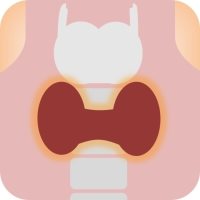
What Are Thyroid Problems?
The thyroid is a gland that sits in the front of the neck and produces several hormones, the most commonly known of which is thyroxine. These hormones influence the rate of metabolism and regulate growth and development. Thyroid problems can result from the gland being overactive (producing too many hormones) or underactive (producing too few hormones). How fertility is affected depends on whether the gland is overactive or underactive.
Underactive Thyroid Problems and Fertility
Having an underactive thyroid is referred to as hypothyroidism (“hypo” is Greek for “under”). This is more common in women of reproductive age than an overactive gland. Hypothyroidism is connected to menstrual problems and a lack of ovulation.
Overactive Thyroid Problems and Fertility
Having an overactive thyroid is referred to as hyperthyroidism (“hyper” is Greek for “over” or “excessive”). Hyperthyroidism is less likely to prevent you from getting pregnant than hypothyroidism, but it has been linked to fertilisation and implantation problems. What is more serious is that once you are pregnant, hyperthyroidism will interfere with the normal progression of pregnancy by increasing risk of miscarriages, premature births, and intrauterine growth restriction (IUGR – a condition where a baby’s growth slows or ceases when it is in the uterus).
As many as 5% of women of reproductive age may experience thyroid problems and the chance getting problems increases the older you get.
Thyroid Problems Symptoms
Hypothyroidism Symptoms
In hypothyroidism (underactive thyroid) women may experience menstrual disturbances such as heavy periods, or an irregular cycle. Women may also develop hair growth in unusual places such as the jawline and chest. In severe hypothyroidism, ovulation may not occur, but in milder cases conception is usually possible naturally. Other symptoms include weight gain, tiredness, depression, constipation and sensitivity to cold.
Hyperthyroidism Symptoms
In hyperthyroidism (overactive thyroid) women may also experience menstrual disturbances, but these tend to be much lighter periods, or no periods at all. Their libido may also be reduced. Other symptoms include unexpected weight loss, hyperactivity, difficulty sleeping and sensitivity to heat.
Thyroid Problems Diagnosis
Both an underactive and overactive thyroid can be tested for easily with a blood test which your GP can arrange.
Thyroid Problem Treatment
Thyroid problems are easily treated with medication and the good news is that correction of the thyroid abnormality usually returns fertility back to normal quickly.
Hypothyroidism Treatment
In hypothyroidism, treatment usually involves a medication containing the missing thyroid hormones. This is safe to take while both trying for a baby and during pregnancy.
Hyperthyroidism Treatment
In hyperthyroidism, medication needs to be given to reduce the action of the thyroid. This is very effective and fertility also resumes quickly once the hormone levels have normalised. However, given the nature of this medication and the possible effects that this can have on a developing baby, it is advised that pregnancy is avoided both during treatment and for 6 months afterwards.
Anything Else I Should Know About Thyroid Problems and Fertility?
A small number of women with thyroid problems, may have an associated autoimmune component to the disorder. This means that their body’s immune system starts to attack the thyroid. If this occurs, the body’s immune system may also start to attack other organs of the body. If the ovaries are affected, this can result in Premature Ovarian Failure.
Thyroid problems can be caused by Diabetes and Cancer which also have impacts on female fertility. You can read more about them in the sections Diabetes and Fertility and Cancer and Fertility.
Links to Popular Related Pages







